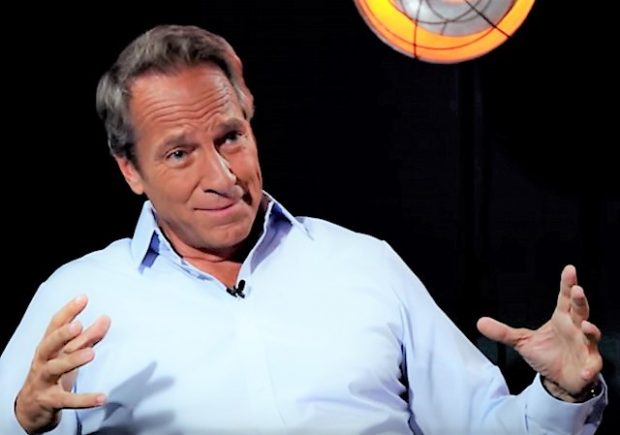
I miss “Dirty Jobs,” unfortunately, I think Rowe’s main message was missed by the scumbag liberals and they substituted their own message. In case you have forgotten, Rowe would visit various workplaces and occupations and work alongside the guy that did the job day in and day out. Sometimes the jobs were exotic, usually, they weren’t. What the jobs shared was they required hard work in unfriendly or dirty environments. Many of the jobs would not be on the list with your average high school guidance counselor. Never-the-less the jobs needed to be done because there was a need or the jobs preserved a skill that would otherwise be lost.
There was an episode on “Two and a Half Men,” that illustrates the attitude that Rowe is talking about. Charlie and Allen are watching TV, but the picture is of poor quality. Charlie comments that he will call, “the guy” to fix it. Allen disagrees and states it is a simple fix to realign the satellite dish, on the roof. Charlie isn’t interested, but Allen prevails. What happens next is predictable. Allen falls off the roof and Charlie is vindicated in his judgment to call “the guy.” Charlie’s whole attitude says that he doesn’t know how to fix the problem, the person who doesn’t deserve a name or title, or recognition of his skill.
Rowe said the gap has always existed to varying degrees, but he now sees a growing “disconnect” and a lack of appreciation of things that are basic in everyday life…
“If we’re not blown away by the miracle that occurs when we flick the switch and the lights come on; if we’re not gobsmacked by flushing the toilet and seeing all of it go away; when we start losing our appreciation for those things, the gap deepens. And I think the gap right now is extraordinary,” said Rowe. Mike-Rowe-on-the-disconnect-between-elites-and-everyday-Americans.
One of the things that always struck me about the workers on “Dirty Jobs” is that they took pride in their skills, the job they did, and the fact that most people wouldn’t or couldn’t do it. Listen to liberals as they put down workers in hazardous occupations or attempt to eliminate the hazardous aspects. I have no problem with mitigation of hazards but elimination is unrealistic and counter-productive. Pride in a job well done is underappreciated. This is not surprising coming from a generation that rewards participation without regard to competence. Superior performance and high achievement have become a curse rather than a virtue.
There seems to be a belief, by liberals, that if they don’t understand something, regard it as unimportant, or don’t want to get their hands dirty then everybody ought to feel the same way. They need to step back and ask themselves a few questions. If the farm laborer stops shoveling manure, where are they going to get their organic produce? If the miner stops processing ore for aluminum, how will solar panels be made? If fast food, large soft drinks, and plastic straws are banned will philosophy and gender studies graduates ever find gainful employment?
I came across this article shortly after I published my comments about Mike Rowe. The writer is from an aborigine from Australia. He has hit on what Rowe tried to demonstrate on his show. He also describes the barriers erected by liberals to prevent the ideas from becoming more widespread.
Increasingly we hear the idea there’s something wrong with wanting people to work. We hear welfare recipients shouldn’t be expected to work. We hear that requiring people to do work or activities in return for welfare is exploitation and wrong. That moving people from welfare to work is unfair because they’ll become part of the “working poor”. That some jobs, like seasonal fruit picking or even work someone is overqualified for, are just not good enough to expect people to go off welfare. That there aren’t enough jobs for unemployed people. That employers discriminate against older and disabled workers so there’s no point them trying.
When I first heard the expression “working poor” I had to ask for an explanation; even then I didn’t understand. People on welfare already live in poverty. So those who warn that welfare-to-work will create a working poor are really saying: being poor is undignified enough, it’s an added indignity to be poor and working. This is a terrible outlook. My family was part of the working poor my entire childhood. Working wasn’t an indignity. It was a source of pride. I’d choose to be part of the working poor over the welfare poor any day. Being in a job – any job – makes the next job opportunity – a permanent job, a higher paid job, a better job – much more likely.
Even outside of the welfare reform debate, we hear anti-work rhetoric. We hear it’s unfair if some people earn less than others, even if they’re less experienced or capable. The latest anti-work political idea is that governments should pay everyone a non-means tested Universal Basic Income with no obligation to work because it’s imagined most jobs will disappear.
The overarching message from the intellectual class is that work is exploitative, an indignity, a burden; that work enforces inequality, is scarce and even endangered. At least, that is, for the downtrodden, the poor, the unskilled, those on welfare, the young, the aged and the disabled; and, in the future, for most unskilled workers.
The mindset of work as something negative is allowing many families and communities to be destroyed. Reclaiming-work-as-a-virtue